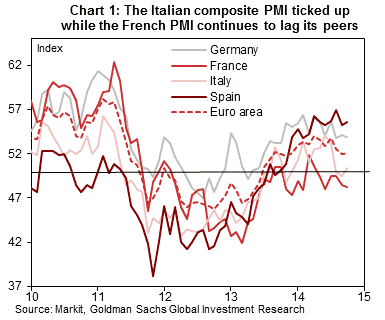Those wondering why European stocks are higher but off earlier highs, the answer is simple: the latest Service ISM was bad but it wasn’t a complete disaster. And while RanSquawk notes that “the particularly disappointing slew of Eurozone Service PMI’s from France and Spain capped any potential upside seen across the European indices” stocks are clearly green on hopes Europe’s ongoing economic devastation accelerates enough for the ECB to finally start buying Stoxx 600 and various other penny stocks, which in turn magically “trickles down” to Europe’s record youth unemployment.
This is what happened, in Goldman’s words: the November Euro area final composite PMI came in at 51.1, 0.3pt below the flash (and Consensus) estimate. Relative to October, the composite PMI fell by 0.9pt. The weaker final composite PMI was driven by flash/final downward revisions to the German manufacturing PMI and the French services PMI. Today’s data also showed some improvement in the Italian services PMI, and a deterioration in its Spanish counterpart.

November’s final manufacturing PMI (published on Monday) came in 0.3pt below the flash reading. This was driven by a downward revision (0.5pt) to the manufacturing PMI in Germany (the French manufacturing PMI flash/final revision was positive). The final Euro area services PMI for November was 0.2pt below the flash, with the flash/final downward revision driven by the French services PMI (revised down 0.9pt).
With these revisions, relative to October, the Euro area composite PMI fell by 0.9pt (to 51.1), reflecting a 0.5pt decline in the manufacturing PMI (to 50.1) and a 1.2pt decline in the services PMI (to 51.1). The breakdown of forward-looking components was mixed. New manufacturing orders fell by 0.8pt to 48.7, while stocks edged down by 0.9pt on the month, leaving the orders-to-stocks ratio stable. The forward-looking elements of the services PMI showed ‘incoming business’ declining by another 1.1pt, while the ‘business expectations’ subcomponent rose by 2.4pt.
The Composite PMIs declined across all major countries on the month, except in Italy. The abrupt fall in the German composite PMI (by 2.2pt to 51.7) owed to sizable 2.3pt and 1.9pt declines in the services and manufacturing PMIs respectively. In France, the 0.4pt fall in the composite PMI (to a weak 47.9) was driven by a similar-sized contraction in the services PMI. The Spanish services PMI eased notably by 3.2pt to 52.7 (Cons: 55.2), leading to a 1.7pt decline in the composite PMI (to 53.8). By contrast, in Italy, while the manufacturing component was unchanged on the month (at 49.0), the services PMI recorded a 1.0pt expansion (to 51.8, Cons: 50.2), driving the composite PMI 0.9 up to 51.2.
In terms of fixed income, the Bund remains relatively unchanged but has since ebbed higher alongside the weak European data releases with some analysts also noting volumes rolling into the next contract ahead of the upcoming expiry on the 8th Dec.
In terms of the day ahead, we have ADP employment change today (consensus +222K) ahead of the all important payrolls on Friday. The US non-manufacturing ISM and the Fed’s Beige Book are the other key releases for today. On Fedspeak we have both Plosser and Brainard lined up for today. In Europe we will kick the day off with a host of services and composite PMI prints with final figures for Germany, France and the Euro-area. We will also get preliminary readings out of Spain, Italy and the UK.
To summarize:
European shares trade mixed, off earlier highs, with the basic resources and health-care sectors outperforming and oil & gas, food & beverage underperforming. Ruble touches record-low for fifth straight day. Euro-area services and manufacturing grew less than initially estimated last month. Italian 10-year yields dropped below 2% for first time. U.K. budget statement later. The Spanish and Swedish markets are the best-performing larger bourses, U.K. the worst. The euro is weaker against the dollar. Japanese 10yr bond yields rise; Spanish yields decline. Commodities gain, with wheat, natural gas underperforming and WTI crude outperforming. U.S. ISM non-manufacturing, mortgage applications, ADP employment change, nonfarm productivity, unit labor costs, composite PMI, services PMI due later.









Leave A Comment